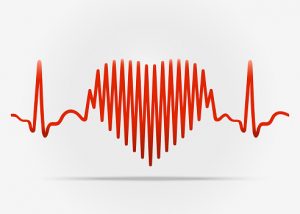
Heartbeat. From the moment it’s formed—the third week after conception—your heart beats continuously until it is interrupted by death or a cardiac event. Depending on your gender, your heart will beat approximately 100,000 times a day, 40 million times a year, or three billion times over a 75-year lifespan. Women’s hearts beat faster than men’s, completing an extra eight beats per minute, meaning these numbers are even higher for the female population.
Electrical impulses. Your heart has its own electrical supply, meaning that if it is separated from the body, it can still continue to beat. Electrical impulses are sent from the heart muscle—called the myocardium—that tell the heart to contract as dictated by the sinoatrial node. The sinoatrial node controls the timing of your heartbeat and is referred to as your heart’s natural pacemaker.
Pump up. The heart—weighing an average of 7 to 15 ounces—pumps approximately 100 gallons of blood throughout your body every hour. This works out to around 2,000 gallons daily—enough to fill 1,600 eight-ounce water glasses.
Head to toe. There are 75 trillion cells in your body, and your heart is responsible for pumping blood to every single one (with the exception of the corneas). When you are at rest, it pumps blood down to your toes and back in just 16 seconds, to your brain and back in eight seconds, and to your lungs and back in only six seconds.
Heart disease. While usually associated with older adults, research has found that children as young as eight years old have shown signs of heart disease, like thickening heart tissue. Heart disease is the number one cause of death for Americans, and researchers have stressed the importance of regular physical activity to protect the heart and counteract the presence of thickened heart tissue, especially in children.
Heartbreak. The emotional pain you feel when losing someone close is often described as heartbreak, and it is a real condition. Medically referred to as stress cardiomyopathy, this condition can induce shortness of breath and chest pains, and research has found that those who have lost a partner have a higher risk of developing an irregular heartbeat—known as atrial fibrillation—within the first year of their loved one’s passing.
Cold hearted. Physically exerting yourself in cold or windy weather can take a toll on your heart health. As your internal body temperature drops, the stress on your heart increases, making activities like shoveling or even walking in cold temperatures potentially dangerous. Bundle up next time you need to venture out into frigid temperatures to protect your heart and prevent it from overcompensating due to the cold.
Heart cancer. Heart cancer is extremely rare, but have you ever wondered why? The organ protects itself in its own unique way—shortly after birth, the cells of the heart stop dividing, which lowers the risk of mutations occurring. This does have a downside, however, as these cells’ inability to regenerate means your heart will remain scarred after suffering any kind of heart damage.
Your heart is a powerful organ saddled with the responsibility of sending blood and oxygen all over your body, keeping everything running smoothly. It pumps gallons of blood and beats approximately 100,000 times daily. It also has its own electrical supply, allowing it to beat even when it is not in the body, though it is susceptible to damage from heart disease or even cardiomyopathy, and as its cells do not regenerate, it can become scarred. February is American Heart Month, so take the time this month to appreciate all the hard work this little powerhouse does for your body and enjoy some heart-healthy habits or snacks in celebration.
Related: Take these tips to heart: How to better your heart health